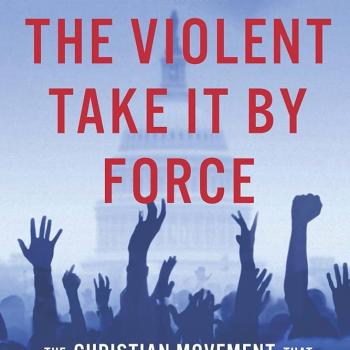I’ve long admired (abstractly, from afar) the kind of piety and devotion described in Brother Lawrence’s The Practice of the Presence of God (the full text is online here) or the idea of Frank Laubach’s “game with minutes” as described in his Letters by a Modern Mystic. Such efforts to find the holy in the mundane and to seek an attitude of love and prayer for everyone we encounter seem saintly in the best sense.*
God knows as well that I’m never further from sainthood then when I’m driving in traffic. Loving prayer is not my first response to the guy tailgating me, or the guy doing 50 in the left lane, or the SUV-drivers who don’t use turn signals when changing lanes. So the idea of treating an Interstate as something holy — a place where, in Laubach’s words, I am “as wide open to people and their need as I am toward God” — seems to me like it could be a Good Thing.
But this is something else entirely: “Christians Movement Calls I-35 a ‘Highway of Holiness.'” (Thanks to Andrew B. for the tip.):
People drive on it every day, sometimes cursing along the way, but thousands of people consider Interstate 35 to be a holy road.
The highway that stretches from Laredo to Duluth, Minn., has grabbed the attention of Christians across the country, including those in Austin. Members of Christian groups along the I-35 corridor said the highway was mentioned in the Bible, and in order to fulfill a prophecy, it needs a little saving first.
According to Light the Highway, the worldwide movement is driving thousands to prayer on the interstate. Christians said the Old Testament’s book of Isaiah prophesizes I-35 will be the United States’ “Highway of Holiness.”
Isaiah 35:8 reads: “And a highway will be there; it will be called the Way of Holiness. The unclean will not journey on it; it will be for those who walk in that Way; wicked fools will not go about on it.”
“Everything we do, we want to make sure scripture is backing us up,” said Austin’s PromiseLand Church Pastor Charlie Lujan. “I-35 being Isaiah 35, it just matched.”
OK, so maybe this is just a bit of whimsical wordplay. Maybe this I-35 = Isaiah 35 notion is just a playful way of finding a hook for a renewed emphasis on prayer. I mean, it’s just not possible that this guy really thinks that the English titles, modern chapter divisions, and the naming conventions of the interstate highway system should be considered as inspired holy writ.
Or maybe it is. Reading on, it doesn’t seem like Lujan and his Light the Highway effort are a terribly whimsical or playful bunch. Isaiah 35 is a joyous expression of millennial hope** but, like our friends LaHaye and Jenkins, these folks don’t seem interested in such promises of future restoration and healing. They’re all about the judgment and the purifying fire. They seem to like Isaiah 35:8 only because of its condemnation of “wicked fools” and “the unclean,” by which they don’t mean the invading armies of Babylon but — what else? — the gay menace:
Lujan conducted a five-week 24-hour prayer vigil and organized what he called a “purity siege” along Austin’s famed Sixth Street. The sieges are part of the I-35 project, a nationwide movement to save those at bars, gay clubs and abortion clinics in cities along the interstate.
“If you just draw a line right down the middle of the nation, and go to these strategic cities along the way and just cry out holiness and purity, we believe there’s going to be a referendum, a change, a radical change in our nation,” Lujan said.
What, you may be wondering, is a “purity siege”? It’s helpfully defined here as:
A spiritual demonstration. In much the same way people protest against governmental or business aspects of society, youth across the nation will “siege” sites of impurity in their city, by doing on-location prayer. They will be protesting the machinations of evil, such as pornography, injustice, abortion and other strongholds. They will stand outside of spiritual strongholds and visually demonstrate their opposition thereof, while doing warfare in heavenly realm.
Light the Highway (read that not as “illuminate” but as “incinerate”) recounts a recent “siege,” conducted in September in Dallas:
Fifty or so young people have gathered on Oak Lawn Avenue, positioning themselves on the sidewalk outside of JR’s Bar and Grill, one of many nightclubs found in this neighborhood, which is well-known for its large population of homosexuals. The group stays in a tight circle, praying and singing worship songs and asking God for holiness. They are there to confront the spirit of perversion and siege unholiness. …
As the Siege continues, the power of God falls, and the young people start evangelizing, talking to, and praying for people including homosexuals, transgender and transvestites. They share with them how God loves them, and through the power of Jesus Christ, they can be set free from their sinful lifestyle. The purpose of the Siege was not to communicate a message of hate or exclusion, but rather, a message of love, forgiveness, acceptance and freedom.
Because, you know, nothing says “love, forgiveness, acceptance and freedom” like a siege and a “tight circle … asking God for holiness.”
The response is overwhelming as people begin to fall on the ground under the power of the Holy Spirit.
I’m not sure who I feel worse for here — the patrons of JR’s harassed by the everything-but-snake-handling prayer meeting on their sidewalk, or the “young people” corralled into this awkwardly aggressive form of “radical evangelism.” The youth leader who organized this expedition, in my opinion, has a millstone-necklace with his name on it.
My own church youth group never laid siege to a gay bar, but I still wince when I recall some of our forays into “radical” evangelism. We did “boardwalk evangelism” down the shore. I personally handed a gospel tract to Madame Marie herself. Unlike the many mission trips our youth group also did, that wasn’t something I enjoyed at the time or felt proud about afterward.
This is the dynamic at work in so much of what fundamentalist and evangelical churches think of as “youth ministry.” Tell a bunch of good church kids what God expects of them and they will do their best to comply. Tell them God wants them to pass out tracts to strangers and they’ll go along. Tell them God wants them to lay siege to a nightclub and they’ll get on the van. They will go along because their conscience will be telling them that if this is what God would have them do, then it is what they ought to do. But their conscience will also be telling them that this seems not just awkward or intimidating, but wrong. “Be bold and courageous for God,” the youth minister will tell them, but they’re not balking out of fear, they’re hesitating out of guilt. That will, in turn, provoke another crisis of conscience as they wonder what’s wrong with them that makes them feel like right is wrong.
You can only stretch that rubber band so many times before it snaps and one of two things will happen. They may decide that their conscience cannot be trusted and thus will stop listening to it, becoming the sort of people who will one day grow up to lead another generation of young people in another round of purity sieges. Or their conscience will win out and they will have their Huckleberry Finn moment:
It was a close place. I took it up, and held it in my hand. I was a-trembling, because I’d got to decide, forever, betwixt two things, and I knowed it. I studied a minute, sort of holding my breath, and then says to myself:
“All right, then, I’ll go to Hell” — and tore it up.
It was awful thoughts and awful words, but they was said. And I let them stay said; and never thought no more about reforming. … And for a starter I would go to work and steal Jim out of slavery again; and if I could think up anything worse, I would do that, too; because as long as I was in, and in for good, I might as well go the whole hog.
Some few of those who snap in the latter direction may eventually come to realize that what God wants is not necessarily the same as what God’s alleged spokesmen say it is, and thus they may wind up rejecting only the advice of the spokesmen, and not rejecting God entirely. But many won’t make that distinction.
This happens all the time. It’s happening, right now, for many of those poor kids from that Dallas youth group that laid siege to JR’s. If you find yourself driving on I-35, say a prayer for them.
– – – – – – – – – –
* And not in the sense of one of my favorite old jokes: What is a saint? A person who always, always, always does the Right Thing. What is a martyr? A person who has to live with a saint.
** As such it’s also the inspiration for one of my favorite Wesleyan hymns, “O for a Thousand Tongues To Sing“: Hear Him, ye deaf; His praise ye dumb, / Your loosened tongues employ; / Ye blind, behold your Savior come, / And leap, ye lame, for joy.















